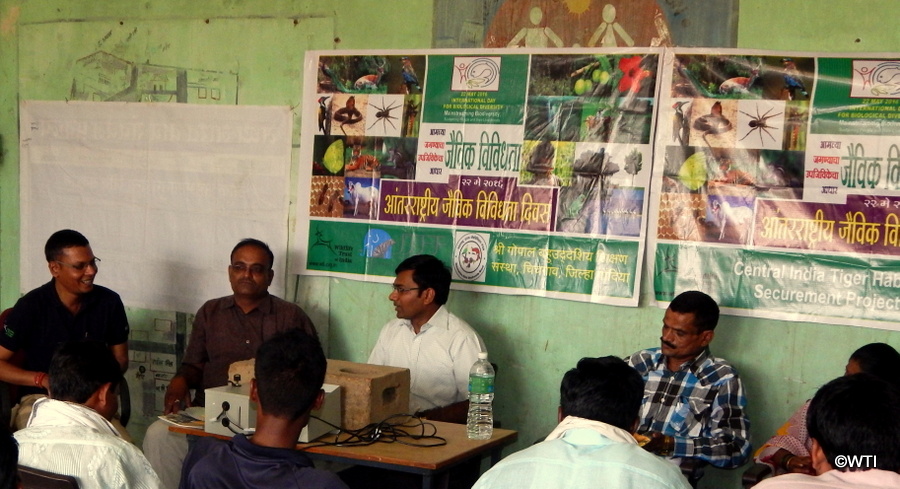 Participants at the biodiversity workshop held at Dawwa Gram Panchayat on May 22, the International Day for Biological Diversity
Participants at the biodiversity workshop held at Dawwa Gram Panchayat on May 22, the International Day for Biological Diversity
Gondia, May 25, 2016: Wildlife Trust of India (WTI), along with the Gopal Bahu Udheshiya Shikshan Sansthan and the Biodiversity Management Committees (BMCs) of Gondia district, Maharashtra, commemorated the United Nations proclaimed International Day for Biological Diversity on May 22 with a workshop on the importance of biodiversity as well as the roles and responsibilities of the newly formed BMCs.
Eight BMCs from Gram Panchayats in the Nagzira-Navegaon Wildlife Corridor – Dawwa, Dalli, Chirchadi, Malpuri, Jhambadi, Murdholi (Maramjob), Telankhedi and Murdholi, from the tehsils of Goregaon, Sadak Arjuni and Deori – participated in the workshop, which was held at the Dawwa Gram Panchayat of the Sadak Arjuni tehsil. WTI’s Anil Kumar, Assistant Manager and Project Lead of the Central India Tiger Habitat Securement Project, briefed the participants on biodiversity and its importance, the Biological Diversity Act of 2002, the Maharashtra Biological Diversity Act of 2008, and the formation of BMCs at different administrative levels, their roles and responsibilities. The participants were given a demonstration of the improved cook stove model, which reduces fuelwood consumption by 40 percent, and shown how even the traditional cook stove could be modified to consume less fuelwood at minimal cost. The use of a solar cooker was also demonstrated, and a new animal acoustic device developed by the Gondia Forest Division to protect crops from wild animals showcased.
The Chief Guest Dr Jitendra Ramgaonkar, DCF and Member Secretary, Gondia District BMC, advised the participating BMC members to begin by documenting plant biodiversity in their respective Gram Panchayats, taking the assistance of village elders to determine which plant species of local importance had disappeared or were declining. On the basis of this, he said, a biodiversity improvement plan could be prepared for their areas. Dr Ramgaonkar suggested that in 2016, the BMCs could plan to establish nurseries of such plant species so that village forests could be restocked with them.
Mr Jadav, RFO, Goregaon, pledged his assistance with the technical details of these proposals, including land surveys, fencing, establishment of nurseries, plantation etc. He also requested everyone present to participate in the Maharashtra government’s programme on July 1, 2016, to plant one crore saplings in the state. Mr Vilas Chawan, President of the Dawwa BMC asserted that the role and importance of BMCs would only increase as the country progressed towards higher economic growth, and urged all members to get actively involved in biodiversity conservation and management, which has the potential to be a major employment generator especially for rural youth.
WTI wishes to acknowledge the efforts of Field Assistants Nitin Rawate and Hiwraj Raut, as well as Deepak Rhangdale of the Shree Gopal Bahu Udheshiya Shikshan Sansthan, in making the workshop a success.